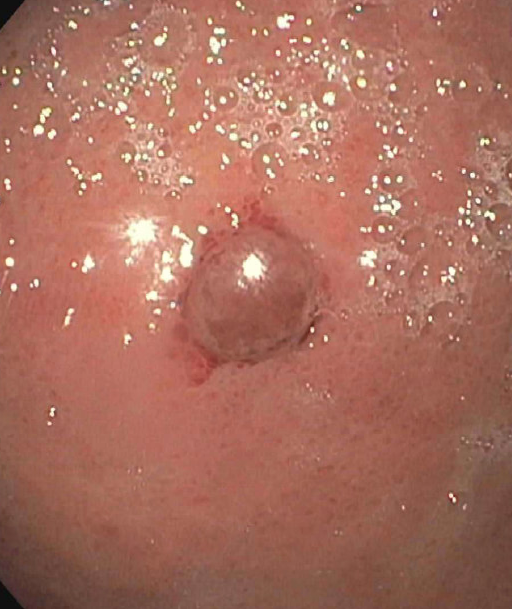Tuesday Poster Session
Category: Stomach and Spleen
P6396 - Incidental Detection of Metastatic Melanoma in the Stomach During Evaluation for Persistent Dysphagia
Tuesday, October 28, 2025
10:30 AM - 4:00 PM PDT
Location: Exhibit Hall
.jpg)
Amil Shah, DO
Parkview Medical Center
Pueblo, CO
Presenting Author(s)
Amil Shah, DO, Ahmad Zain, MBBS, Muhammad Sohaib, MBBS, Mena Tawfik, MD, Sung Yang, MD
Parkview Medical Center, Pueblo, CO
Introduction: Metastatic melanoma (MM) to the gastrointestinal (GI) tract is uncommon but can present with nonspecific symptoms, such as abdominal pain, weight loss, nausea, vomiting, GI bleeding, or iron deficiency anemia. Dysphagia is a common symptom with a broad differential ranging from structural to motility disorders. Rarely, it can lead to the incidental diagnosis of metastatic malignancy. This case highlights an elderly male with dysphagia, ultimately found to have metastatic melanoma of the stomach.
Case Description/
Methods: An 88-year-old male presented with dysphagia. EGD revealed Los Angeles (LA) grade B esophagitis, three superficial esophageal ulcers and gastritis. Esophageal biopsies showed reflux esophagitis. He was started on pantoprazole 40 mg daily with symptomatic improvement. A modified barium swallow study (MBSS) showed mild pharyngeal deficits and possible esophageal dysphagia.
After one month, he remained well controlled. However, after six months, he reported recurrence of dysphagia to solids and liquids.
Repeat EGD was performed showing diffuse, moderate antral inflammation, a 7 mm sessile polyp with a dark rim in the gastric body. Gastric biopsies showed mild chronic gastritis. The gastric polyp biopsy revealed metastatic melanoma. He was referred to oncology for staging and further evaluation, including assessment for a primary cutaneous lesion. Further management - including consideration of endoscopic ultrasound and polyp resection - would have depended on the extent of disease and systemic treatment planning. However, the patient elected to pursue hospice care and ultimately passed away comfortably in his own home.
Discussion: Melanoma metastases to the GI tract can present with vague symptoms or as incidental findings on routine evaluation. Although up to 60 percent of melanoma patients show GI involvement at autopsy, only one to five percent are symptomatic during their lifetime. Lesions may appear as ulcers, masses, or polyps, and may go unnoticed without thorough evaluation. This case highlights the importance of timely endoscopy in patients with recurrent or refractory dysphagia, even when initial workup is benign. Treatment includes systemic immunotherapy or targeted therapy, with local endoscopic resection reserved for symptom relief or localized disease. This case also illustrates how common GI complaints may occasionally lead to the discovery of advanced malignancy with poor prognosis, reinforcing the importance of individualized goals-of-care discussions.

Figure: A 7 mm sessile polyp with a dark rim in the gastric body
Disclosures:
Amil Shah indicated no relevant financial relationships.
Ahmad Zain indicated no relevant financial relationships.
Muhammad Sohaib indicated no relevant financial relationships.
Mena Tawfik indicated no relevant financial relationships.
Sung Yang indicated no relevant financial relationships.
Amil Shah, DO, Ahmad Zain, MBBS, Muhammad Sohaib, MBBS, Mena Tawfik, MD, Sung Yang, MD. P6396 - Incidental Detection of Metastatic Melanoma in the Stomach During Evaluation for Persistent Dysphagia, ACG 2025 Annual Scientific Meeting Abstracts. Phoenix, AZ: American College of Gastroenterology.
Parkview Medical Center, Pueblo, CO
Introduction: Metastatic melanoma (MM) to the gastrointestinal (GI) tract is uncommon but can present with nonspecific symptoms, such as abdominal pain, weight loss, nausea, vomiting, GI bleeding, or iron deficiency anemia. Dysphagia is a common symptom with a broad differential ranging from structural to motility disorders. Rarely, it can lead to the incidental diagnosis of metastatic malignancy. This case highlights an elderly male with dysphagia, ultimately found to have metastatic melanoma of the stomach.
Case Description/
Methods: An 88-year-old male presented with dysphagia. EGD revealed Los Angeles (LA) grade B esophagitis, three superficial esophageal ulcers and gastritis. Esophageal biopsies showed reflux esophagitis. He was started on pantoprazole 40 mg daily with symptomatic improvement. A modified barium swallow study (MBSS) showed mild pharyngeal deficits and possible esophageal dysphagia.
After one month, he remained well controlled. However, after six months, he reported recurrence of dysphagia to solids and liquids.
Repeat EGD was performed showing diffuse, moderate antral inflammation, a 7 mm sessile polyp with a dark rim in the gastric body. Gastric biopsies showed mild chronic gastritis. The gastric polyp biopsy revealed metastatic melanoma. He was referred to oncology for staging and further evaluation, including assessment for a primary cutaneous lesion. Further management - including consideration of endoscopic ultrasound and polyp resection - would have depended on the extent of disease and systemic treatment planning. However, the patient elected to pursue hospice care and ultimately passed away comfortably in his own home.
Discussion: Melanoma metastases to the GI tract can present with vague symptoms or as incidental findings on routine evaluation. Although up to 60 percent of melanoma patients show GI involvement at autopsy, only one to five percent are symptomatic during their lifetime. Lesions may appear as ulcers, masses, or polyps, and may go unnoticed without thorough evaluation. This case highlights the importance of timely endoscopy in patients with recurrent or refractory dysphagia, even when initial workup is benign. Treatment includes systemic immunotherapy or targeted therapy, with local endoscopic resection reserved for symptom relief or localized disease. This case also illustrates how common GI complaints may occasionally lead to the discovery of advanced malignancy with poor prognosis, reinforcing the importance of individualized goals-of-care discussions.

Figure: A 7 mm sessile polyp with a dark rim in the gastric body
Disclosures:
Amil Shah indicated no relevant financial relationships.
Ahmad Zain indicated no relevant financial relationships.
Muhammad Sohaib indicated no relevant financial relationships.
Mena Tawfik indicated no relevant financial relationships.
Sung Yang indicated no relevant financial relationships.
Amil Shah, DO, Ahmad Zain, MBBS, Muhammad Sohaib, MBBS, Mena Tawfik, MD, Sung Yang, MD. P6396 - Incidental Detection of Metastatic Melanoma in the Stomach During Evaluation for Persistent Dysphagia, ACG 2025 Annual Scientific Meeting Abstracts. Phoenix, AZ: American College of Gastroenterology.
